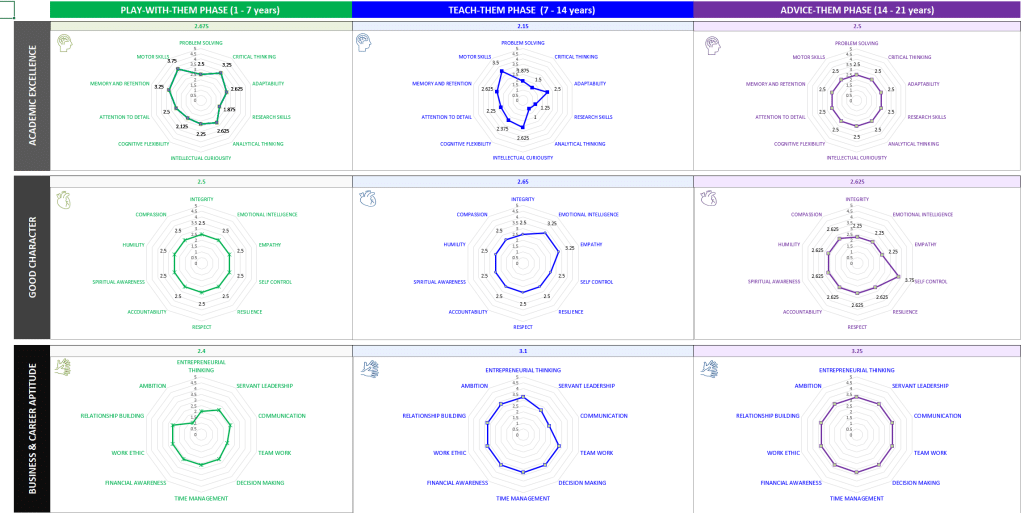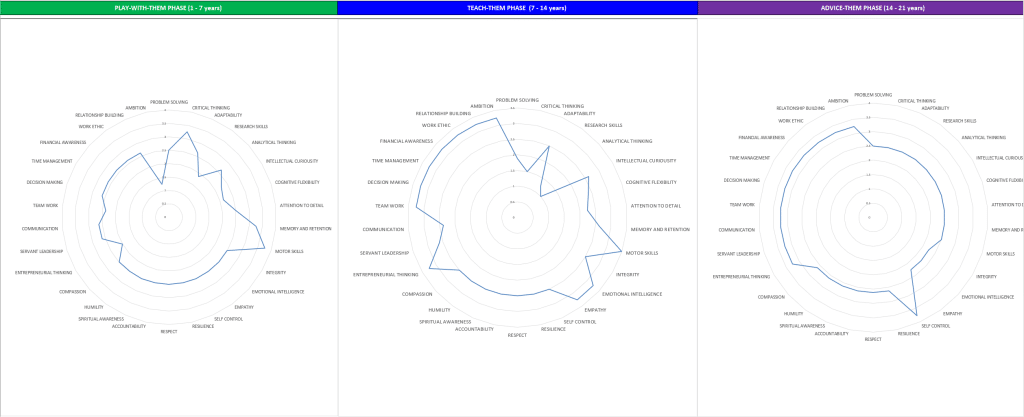
Awakening The Capabilities That Really Shape a Life
Parents often ask us: “How do you teach critical thinking, research skills, analytical reasoning, emotional intelligence, courage, financial literacy, etc — and the rest of the 30 capabilities in your iSTECAMMO™ framework?”
It does sound ambitious, but here’s the truth: in an optimal social and cultural setting, these things are not formally taught. They are absorbed through rich, lived experiences.
- You learn resilience wrestling with real setbacks.
- You learn teamwork playing football on the field with children of different ages.
- You learn financial literacy the first time you’re trusted to handle real money at a market.
- You learn emotional intelligence when you navigate friendships, disappointments, and forgiveness.
These capabilities are caught more than they’re taught. However the societal challenges we face today require a more attentive approach to how we track and inculcate these capabilities in our children.
The Challenge Parents Face Today
Today, our children’s lives are dominated by scrolling feeds and AI-curated experiences. The natural laboratories of childhood such as farmlands, long play hours, extended family, community interactions — are shrinking fast. The proverbial “village” that once helped parents raise children has, in many ways fallen apart. This means parents now have to make a lot more effort to curate the right balance of life experiences so their children can grow holistically. Parents now find themselves carrying everything: Managing academics, instilling values, building resilience, nurturing social skills -all while keeping the family engine running — children fed, bills paid, careers afloat.
But here’s the reality, the sad truth – it’s not working for most parents. It’s difficult. It’s expensive. And time is painfully scarce to orchestrate deep and meaningful experiences for our children. Yet without such deep meaningful intellectual, social, and life experiences, children are left stunted in their growth. And as a consequence they face unprecedented challenges:
- Mental health struggles — depression, anxiety, isolation.
- Lack of purpose and inability to make impact around them.
- Escapism & addictions — gaming, pornography, digital dependency, beginning shockingly young.
- Disillusionment & confusion — identity crises, gender dysphoria.
These are not distant “fables” or exaggerated headlines from Stewards.ONE. Unfortunately, they are heavy realities that parents live with every day — often in silence, fearing judgment, or comparing themselves with others who may secretly be carrying even greater burdens.
And no, the answer cannot be: “There’s nothing we can do.” At Stewards.ONE, these are the challenges that keep us awake. We are striving to respond. We know we cannot solve everything overnight, and we don’t claim to have all the answers. But what we do have is a deep sense of urgency — and a commitment to act. This is not about cashing in on misfortune, or chasing profit. It’s about building impact — sustainably.
That’s why we created Awaken: A structured way for young people to grow in the capabilities that matter for living a full life in these challenging times.
Awaken: A Closer Look
Awaken is our Integrated Stewardship Capability Development Programme designed to help children grow into balanced, capable young adults who can make positive impact to their communities.
It begins with one simple but powerful step:
Assess each child’s capability maturity level.
Using our iSTECAMMO™ framework, we baseline across 30 capabilities grouped into:
- Academic (intellectual capabilities)
- Character (emotional and spiritual development)
- Business & Career (practical and vocational skills)
This gives parents a new kind of insight — not just “How is my child doing in Maths?” but “How is my child developing as a whole person?”. Thing of Awaken as your child’s dashboard of holistic development – a way to keep a finger on the pulse of their growth over time. It helps you see their strengths, spot gaps early, and support your child where it matters most.
To make this real, let’s analyse a sample assessment result dashboard, shown through 9 radar charts. (Note: Some responses have been adapted for clarity and are not reflective of the original assessment.)

These charts illustrate the journey of a single child across three key developmental phases.
- Play-With-Them Phase (1–7 years)
- Teach-Them Phase (7–14 years)
- Advise-Them Phase (14–21 years)
In this example, the child has taken only one assessment per phase. In reality we recommend annual assessments to track steady growth and provide timely support before weaknesses harden into habits.
1. Academic Excellence (Intellectual Capabilities)
At the earliest stage (1–7 years), we see a scatter of developing strengths — curiosity, memory retention, and motor skills are emerging but uneven. By the Teach-Them Phase (7–14 years), some intellectual areas like research skills and analytical thinking improve, but problem-solving and critical thinking still lag behind. By the Advise-Them Phase (14–21 years), the chart rounds out more evenly, showing better balance across memory, adaptability, and reasoning — though some areas remain lower than ideal.
This shows that while natural academic growth happens with age, intentional guidance (especially in problem-solving and analytical skills) makes a significant difference.
2. Good Character (Emotional & Spiritual Capabilities)
In the Play-With-Them Phase (1–7 years), emotional intelligence, empathy, and compassion are still early traits, with resilience, self-control not yet strongly developed. By the Teach-Them Phase (7–14 years), character traits like empathy, accountability, and respect begin to surface more strongly. In the Advise-Them Phase (14–21 years), self-control and resilience become more visible strengths, but humility and compassion still show room for growth.
This demonstrates how character traits can develop unevenly and need consistent reinforcement — especially humility, accountability, and compassion, which often require modelling at home and in community.
3. Business & Career Aptitude (Technical Capabilities)
In the Play-With-Them Phase (1–7 years), capabilities like entrepreneurial thinking, leadership, and financial awareness are low. By the Teach-Them Phase (7–14 years), teamwork, decision-making, and communication rise, though entrepreneurial thinking and leadership still require nurturing. In the Advise-Them Phase (14–21 years), we see clearer balance: time management, financial awareness, and leadership start to emerge, but ambition and entrepreneurial drive still need deliberate encouragement.
The lesson here is that technical and vocational aptitudes don’t just appear; they must be practised through real projects, role-play, and real-world exposure.
4. Combined View – All 30 Capabilities Together
When we combine results for all 3 domains, we see the big picture:

4.1. Play-With-Them Phase (1–7 years) – Combined View
At this early stage, the chart looks scattered and uneven. However we have also seen children who possess not only rounded personality but also score high across all capabilities at this stage. As per the chart, this child shows sparks of curiosity, problem-solving, and empathy, but on average most capabilities are underdeveloped.
- Peaks appear in basic motor skills, memory, and a few flashes of problem-solving.
- Sharp dips are seen in financial awareness, leadership, and resilience
Takeaway: At this stage, children need playful experiences such that capabilities can be absorbed naturally, through stories, games, and imitation of role models.
4.2. Teach-Them Phase (7–14 years) – Combined View
By the middle stage, the chart shows a broader spread. Some capabilities begin to emerge strongly (memory, teamwork, empathy, financial awareness), but others remain patchy.
- Noticeable growth in collaboration, time management, and communication.
- Still clear gaps in resilience, entrepreneurial thinking, and research skills.
- Emotional-spiritual traits like humility and spiritual awareness need more intentional modelling and practice.
Takeaway: This is the phase where structured guidance matters most. Children start connecting actions to values, but they need direction, supervision, and chances to practice capabilities in real-life scenarios.
4.3. Advise-Them Phase (14–21 years) – Combined View
By the final stage, the chart smooths out considerably. The shape becomes more rounded, reflecting a stronger balance across intellectual, emotional, and practical domains.
- Strengths emerge in analytical and problem-solving skills, teamwork, and financial awareness.
- Weaknesses narrow down to a few sharper dips, like resilience and self-control, which often require repeated testing in real-life pressure situations.
Takeaway: This stage shows how a child matures into a more balanced young adult. But it also highlights why waiting until this late stage to assess is risky — by then, gaps are harder to close.
Overall Lesson
When viewed side by side, the combined chart tells a simple but urgent story:
- Growth happens naturally, but unevenly.
- Some capabilities strengthen with age, others stagnate or lag behind.
- Without yearly assessments and targeted interventions, many gaps will remain unnoticed until much later — when they’re harder to fix.
This is why our iSTECAMMO™ framework matters. It gives parents and educators a way to see all 30 capabilities at once, track progress, and shape intentional growth. In these times, parents should not leave these developments to the natural flow of school life or chance. School Grades alone don’t tell the full story. But when we measure capabilities alongside academic learning, we get a true picture of the child’s readiness to thrive in real life.
Awakening: Inspire, Act, and Reinforce
One of the first questions parents ask is:
“But how do you actually teach this online to help my child?”
The answer: we don’t lecture about critical thinking, resilience, leadership, or creativity. We build them. At the heart of our approach is the role model. Every capability development class begins with a story — often drawn from the life of a role model. For us at Stewards.ONE we use the Prophet Muhammad ﷺ, his Companions, and/or a modern inspiring figure students can connect with – as role models.
Why stories? Because stories are mirrors. They let children see what courage, patience, honesty, or creativity look like in real life. They’re not abstract ideals — they’re lived examples.
And then, we move from story to practice, and from practice to reinforcement. Here’s what a typical week looks like (3 classes per week):
1️⃣ First Class– Inspire through Storytelling & Role Models
We begin with a story. Instead of saying “today we’re learning about integrity,” we ask:
“What quality helped this role model succeed in this story?” Students discuss back and forth until we collectively nail down the trait. They discover it for themselves, they own it, rather than being told.
2️⃣ Second Class– Activate through Action & Practice
The story now turns into action. Students take part in projects, games, and challenges that make the capability tangible:
- Honesty in a trading game.
- Teamwork in a survival task.
- Perseverance in a problem-solving puzzle.
They don’t just hear about the capability — they practice it.
3️⃣ Third Class– Reinforce through Reflection & Real-Life Assignments
This is where we reinforce lessons from first and second class through parental collaboration. Students are sent into real life with an assignment, supervised by parents, and reported back the following week.
Examples include:
- A stand-up speech event at home over the weekend.
- Running a fruit stall to learn financial literacy.
- Spending three hours in the neighbourhood picking rubbish to practice service and humility.
Parents play a vital role here — ensuring the experience is real, then feeding back observations so we can close the loop together. The formula is simple but transformative: Inspire → Activate → Reinforce. This is how capabilities move from theory to practice to lifelong habit.
Why Awaken Truly Matters for Our Children’s Future
Because high grades don’t always equal real-world readiness. Because the world our children will inherit demands adaptability, courage, creativity, and compassion, not just the ability to pass exams. And most importantly, because parents shouldn’t have to do this alone.
Over time, for parents who enrol their children in Awaken – they will not just build individual capabilities for their children, their children will have access to a community of peers who grow together (online/offline). Students who support and challenge each other, forming bonds rooted in mutual appreciation for academic excellence, good character, and business and career acumen.
And because collaboration matters, we’re happy to share our Awaken curriculum with schools who wish to adopt it. We train teachers in using the assessment and welcome partnerships that widen the impact for more families.
Be Awaken 2025/26
Our Awaken – Capability Development Programme begins this September:
✅ 30 weeks
✅ One capability per week
✅ Three sessions each week
✅ Continuous feedback
✅ Tailored growth plans
💡 Important:
If your child is already enrolled in our full-time Stewards.ONE Online School, you don’t need to register separately for Awaken — it’s already built into their timetable.
If you are not yet a full-time student, you can enrol directly into Awaken as a standalone programme. For 2025/26, we are running two concurrent streams:
1️⃣ Ages 7–14 (limited to 10–14 years)
🔗 Learn more & enrol
2️⃣ Ages 14–21 (limited to 10–16 years)
🔗 Learn more & enrol
Because our children deserve to graduate not only with certificates, but with the skills and capabilities that last a lifetime.






Responses